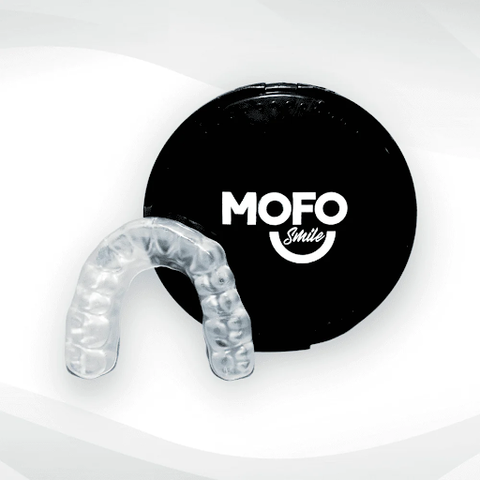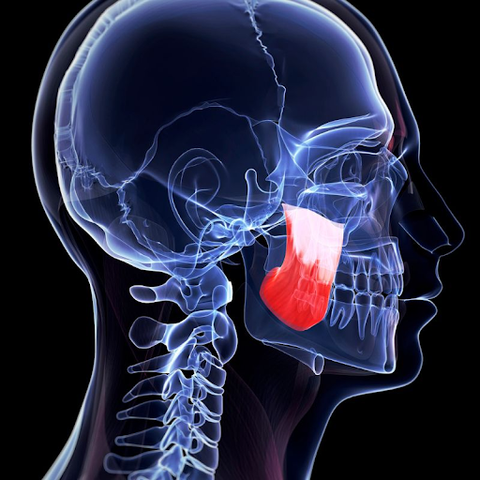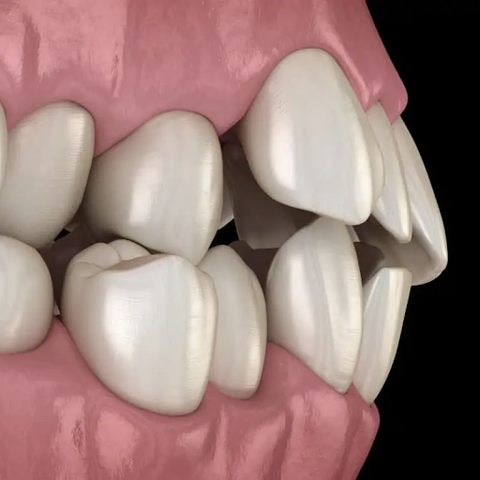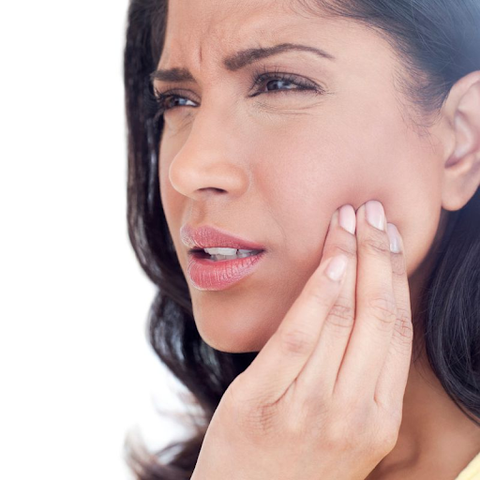Clenching or tooth grinding at night, medically termed as ‘sleep bruxism,’ might seem like a harmless quirk. However, it bears some surprisingly impactful consequences for your dental health in the long run.
One of the best ways to prevent clenching and protect your teeth is by using night time mouthguards. They are specially designed to combat the stresses and strains of nocturnal teeth grinding.
Mouthguards for grinding prevent tooth damage, reduce jaw strain, alleviate headaches, protect enamel, stabilise your bite, and do much more.
But just how do these dental appliances work their magic? Are they really the solution to ending our unconscious jaw workouts?
That is what we wish to explore in this article. We will delve into the seven distinct ways mouth guards for teeth clenching rise to the occasion.

1. REDISTRIBUTION OF PRESSURE
Have you ever bitten into a crisp apple or a hard candy and felt that sudden jarring pressure on your teeth? Now, picture subjecting your teeth to similar forces, night after night, due to involuntary clenching and grinding. It’s like a silent dental onslaught that could lead to unwelcome fractures or chips.
Here is where dental guards play a vital role. Think of it less like a piece of silicone acting as the peacemaker in a tense standoff.
When we clench, our teeth are subjected to concentrated forces that can single out specific teeth for undue stress.
The night guards, however, evenly distribute this pressure across our jaws. The outcome? Teeth that are shielded, ensuring they greet the new day without bearing the battle scars of the night!
A good fit is the keystone of your mouthguard’s ability to redistribute pressure effectively.
With MYMOFOSMILE’s precision-engineered design, your dental night guard hugs every contour of your teeth, ensuring optimal pressure distribution.

2. REDUCTION IN JAW MUSCLE STRAIN
Have you ever tried holding a heavy grocery bag for too long and felt your arm muscles scream in protest? That is somewhat analogous to what our jaw muscles go through when we clench our teeth incessantly.
They are working overtime, and they are not thrilled about it!
But here is the good news: mouth guards or bite splints are like that friend who notices you struggling with the bag and offers to help. By acting as a cushion, they provide a comfortable buffer that eases the constant pressure on the jaw muscles.
Instead of your teeth grinding directly against each other, they are met with a soft barrier. The relief is palpable, and the tension in the jaw muscles starts to subside.
Over time, this simple act can mean less morning jaw pain and a significantly more comfortable start to your day.

3. PREVENTION OF TOOTH MOVEMENT
Everyone loves perfectly symmetrical teeth, right? Perhaps you may have spent time (and braces-filled teenage years) achieving the perfect symmetry. But then along comes this sneaky nighttime habit of clenching, and just like a row of dominos knocked slightly askew, our teeth can gradually drift from their ideal spots.
It is disheartening to think that our subconscious habits might undo all that orthodontic effort, isn’t it? But here is where the night guards enter the scene.
Acting as a stabilising force, a mouth guard is like a gentle hand holding the dominos in place, ensuring they don’t topple or shift.
So, while we dream of beaches and adventures, your dental night guard ensures we wake up with that well-aligned smile, just as we left it the night before!

4. DECREASING RISK OF TMJ DYSFUNCTION
The temporomandibular joint (TMJ), a crucial crossroad connecting our jaw to the skull, can become a hotspot for pain and discomfort due to constant teeth grinding.
Over time, this wear and tear escalates into full-blown TMJ disorders, throwing a wrench into simple tasks like chewing or even just chatting about the weather.
By putting the brakes on excessive clenching and grinding, mouth guards are a buffer, preventing our jaw’s overexertion and the potential escalation of TMJ issues and jaw pain.
So, while it might seem like just a piece of protective gear, it is preserving your precious smiles and the gears behind them in the grand scheme of things.

5. PROTECTION OF DENTAL RESTORATIONS
Imagine splurging on a pristine, brand-new smartphone and then realising there is a risk of getting scratched every night. You would naturally invest in a protective case, right?
Similarly, after spending time, effort, and not to mention money on dental work like fillings, dental crowns, or implants, the last thing you want is nighttime clenching, ruining them.
The constant teeth grinding and pressure are especially harmful to these delicate works of dental artistry.
But with a mouth guard in place, there is a gentle barrier, deflecting harm and keeping all that meticulous dental craftsmanship in pristine condition.
While our subconscious habits might threaten our dental masterpieces, the night guard stands guard, ensuring every piece remains pristine.
6. PREVENTION OF GUM RECESSION AND DAMAGE
Preventing gum recession and damage is crucial for maintaining optimal oral health. When an individual engages in continuous clenching, they inadvertently place undue stress on their gums.
The repetitive force can cause the gums to pull back from the teeth, a process known as gum recession.
Over time, the delicate tissue wears away, exposing more of the tooth or the tooth’s root. In extreme cases, the bone supporting the teeth can also suffer damage.
Introducing a mouthguard into one’s dental care routine is a protective barrier.
It distributes the intense biting pressure more evenly across the dental arch, minimising the force directly impacting the gums and bone.
By doing so, mouthguards play a pivotal role in safeguarding the gums and the underlying bone, ensuring they remain healthy and robust.
MYMOFOSMILE’s custom mouth guards might be the perfect solution against gum recession due to clenching. Expertly designed at our dental laboratory to reduce nighttime clenching, they protect your gums and jawbone from further damage.
7. PREVENTION OF TOOTH SENSITIVITY
Have you ever sipped a chilly drink and felt that sharp, unexpected jolt in your teeth? One of the culprits behind this pesky sensation is none other than our nightly clenching habits. Continuous clenching is like an over-enthusiastic sandpaper session on a wooden surface – over time, the enamel wears down, revealing the more sensitive layers beneath.
The result? Those cringe-worthy zings when enjoying your favourite ice cream or morning coffee. A mouth guard acts like a protective shield, preventing your teeth from grinding away their protective coats.
With a night guard on duty, you can enjoy that ice cream or hot cocoa again without unexpected tooth pain.

FAQS
Let’s cover a few questions that might run through your mind when considering mouth guards.
WHAT IS THE TYPICAL LIFESPAN OF MOUTHGUARDS?
Mouth guards typically last anywhere from 6 months to a few years, depending on the type, usage frequency, and wear and tear. Nightly teeth grinders might notice a shorter lifespan.
Regardless, inspecting your mouth guard regularly for signs of wear and replacing it when necessary to ensure optimal protection is vital. And remember, a well-maintained night guard is a long-lasting one!
ARE THERE ANY ADVERSE EFFECTS ASSOCIATED WITH WEARING MOUTHGUARDS?
While mouth guards offer many benefits, there can be some drawbacks. Improper fit might lead to discomfort or difficulty breathing.
Over time, they can harbour bacteria if not cleaned properly, potentially causing oral infections. Also, some users might initially experience increased salivation.
SHOULD A MOUTH GUARD BE PLACED ON THE UPPER OR LOWER TEETH?
Most commonly, night guards are designed for the upper teeth. This is because the upper teeth often take the brunt of trauma, and the guard provides a protective barrier.
However, individuals with braces or specific dental concerns might require a lower guard. Your dentist or orthodontist can guide you to the appropriate choice tailored to your unique dental profile and needs.
DOES INSURANCE TYPICALLY COVER THE EXPENSES OF A NIGHT GUARD?
In Australia, whether a night guard is covered by insurance largely depends on your specific health insurance policy and its extras coverage.
Some insurers might partially or fully cover the cost, especially if medically necessary.
However, it’s crucial to check with your provider and understand the terms of your policy.
IS WEARING A NIGHT GUARD COMFORTABLE?
Wearing a night guard, when properly fitted, is generally comfortable. Initially, there might be a brief adjustment period as you get accustomed to the sensation.
However, a well-made, custom mouth guard like the one from MYMOFOSMILE should feel snug and not cause any significant discomfort.
TAKEAWAY: GUARD AGAINST TEETH-CLENCHING HAVOC WITH MOUTHGUARDS!
Night guards are unsung heroes in our nighttime routines, stepping in to combat the sneaky habit of clenching. From evenly distributing pressure to preventing tooth movement and even guarding our precious dental work, they offer multiple layers of protection.
Investing in a night guard could be a game-changer for anyone troubled by nighttime teeth grinding or clenching. It’s more than just a protective piece; it’s a ticket to a more comfortable, undisturbed sleep and a safeguard for that priceless smile.
MyMOFOSMILE’s mouthguards are crafted precisely to ensure a perfect fit for maximum comfort. Experience the blend of innovation and personalisation.
Guard your smile with the best mouthguard tailored just for you.



